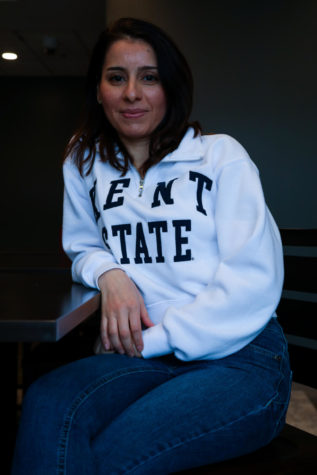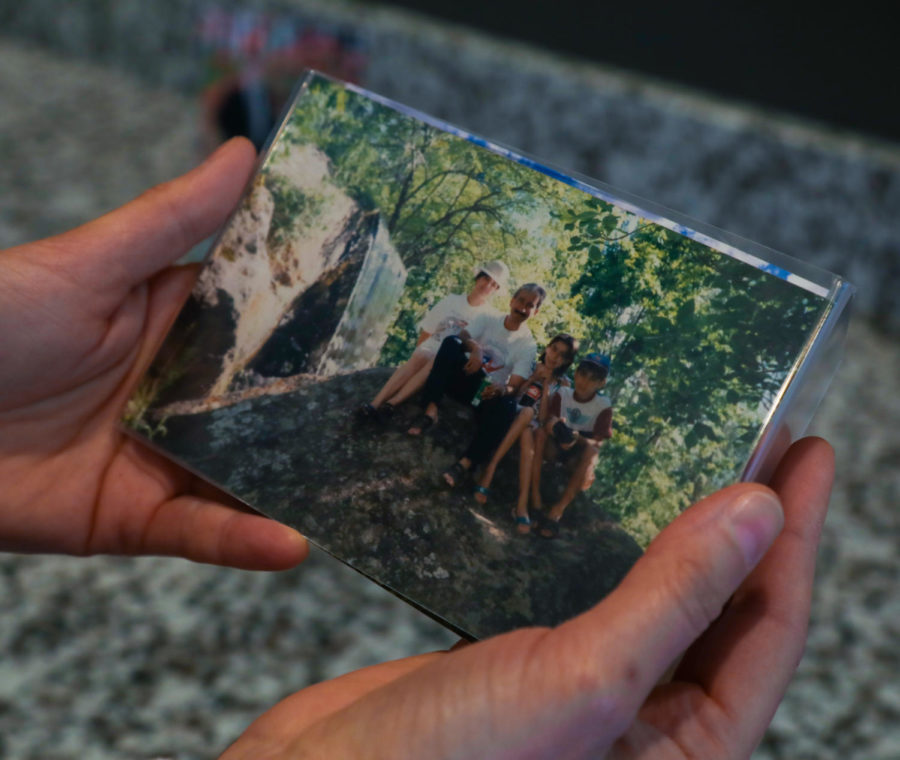Pakiza Shirinova: Taking Life Day by Day
Pakiza holds a photo of her family from Kant, Kyrgyzstan. Her family still lives in Kant, while she lives in Kent completing her degree. Photo by Sophia Lucente.
February 4, 2023
For Pakiza Shirinova, a graduate student at Kent State University, her future in the United States is never guaranteed.
Pakiza has only one year until her student visa runs out and she could be forced to return to Kyrgyzstan. The visa process is a lottery and even with her credentials, it is impossible for her to plan her future in the United States.
“It’s always risky, it’s always 50-50. It’s pretty much up in the air until the very last moment, until you talk to the officer the day before and they say, ‘Okay come get your passport,’” she said. “It’s one of the challenges for international students, they can never relax.”

Photo by Sophia Lucente.
Pakiza was born in Kant, Kyrgyzstan, a country in Central Asia. She was first introduced to American culture in grade school, through a Peace Corps volunteer named Todd. Pakiza’s father was a project manager and one of the few English speakers in Kyrgyzstan, which is how their family was introduced to Todd.
“He actually played a very crucial role in my personal and professional development,” she said. “I remember those years as some of the best.”
Besides soap operas on TV, this was Pakiza’s first exposure to American culture. Pakiza said Todd would tell her and her family about his traditions at home, his family, and the different places he’s visited. She described it as “something surreal,” because they had none of those opportunities in Kyrgyzstan.
“She was always very curious about the outside world because she had not traveled anywhere,” Todd said. He taught Pakiza everything about America, sparking her interest.
In high school, Pakiza entered a competitive student exchange program to try to come to the United States. After that opportunity did not work out, she did a language program through Doane University and stayed with Todd’s family.
Pakiza was only supposed to stay for eight weeks. She ended up staying for eight months.
After the language program ended, she went home for a year and then attended the University of Nebraska-Lincoln to finish her undergraduate degree and complete a master’s degree in community regional planning and hazard mitigation.
After one year of working in her field in Nebraska, her visa ran out, and she was forced to return to Kyrgyzstan.
It took her seven years to return.
She said while back in Kyrgyzstan, she could not work in her field because hazard mitigation does not exist there, so she had to start over with her degree. On top of that, her family is an ethnic minority, Azeri, which makes up .3 percent of the population. One of the struggles with being part of a small minority is that she does not speak the national language, Kyrgyz; her first language is Russian.
The only way she could return to the states was through another student visa, which required her to apply to highly competitive doctoral programs.
At the very end of the seven years, after struggling to find doctoral programs and get a visa, she came across Kent State. She also found Martha Merrill, a Kent State faculty member doing research in Kyrgyzstan. This motivated her to apply to Kent’s doctorate program, and she got in.
“After so much time has passed, you kind of start losing hope. I was almost coming to terms with my being in Central Asia, then it clicked. I got the funding, and Dr. Merrill agreed to take me as her advisee,” she said. This semester is her second semester at Kent studying higher education.
Not only has Merrill helped Pakiza, but Pakiza has informally helped Dr. Merrill with her research. Merrill said she and Pakiza have talked about Pakiza’s experiences being an ethnic minority in Kyrgyzstan, something Merrill does not encounter often.
“You don’t often hear about some of the experiences of ethnic minorities. We talked about what it is like to be Azeri, in a country that means land of the Kyrgyz,” Merrill said.
Even with the struggles of the visa process, Pakiza said it is worth it to be able to live and learn in the United States. The last time she had a clear vision of her future, her life changed significantly. This time around, she is taking it day by day, she said.
“It is still very much worth it to come here, to be here,” she said. “It’s just not comparable.”
Pakiza hopes to continue her career in higher education in the United States after she graduates with her doctoral degree from Kent State.


















